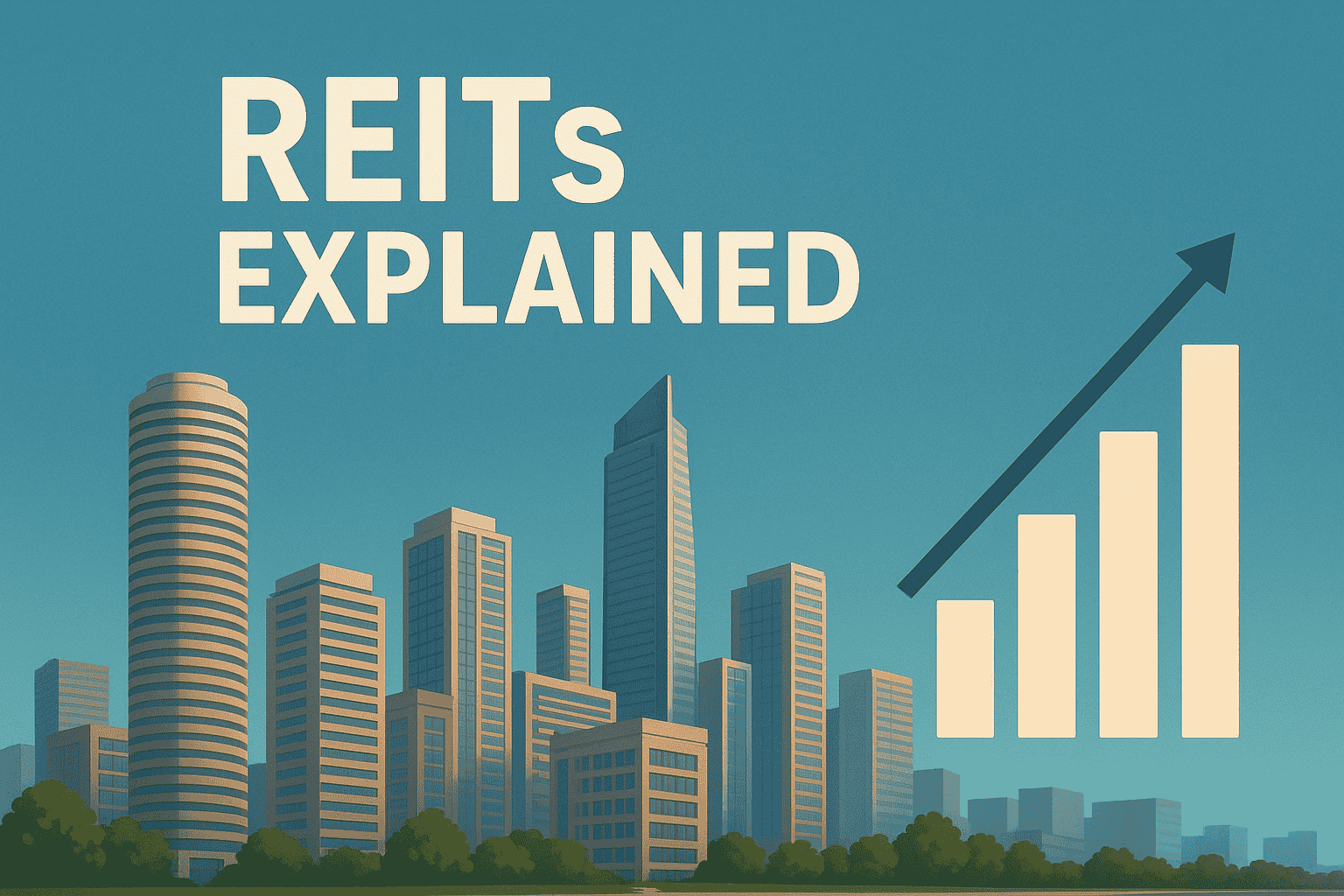Real Estate Investment Trust (REIT): Complete Guide to Benefits, Types Risks & How to Invest
A Real Estate Investment Trust (REIT) lets investors earn from real estate without owning property directly. REITs pool money to invest in income-generating assets like offices, malls, and warehouses, offering steady dividends and long-term growth.
What Are REITs?
A Real Estate Investment Trust (REIT) is a company that owns, operates, or finances income-generating real estate. Similar to mutual funds, REITs pool money from investors and invest in diversified property portfolios — such as offices, malls, warehouses, and hotels — to generate steady rental income and long-term capital appreciation.
In short, REITs let you invest in real estate without buying property directly, making it a powerful tool for passive income and portfolio diversification.
How Does a Company Qualify as a REIT?
To qualify as a REIT, a company must meet certain conditions defined by regulatory authorities like SEBI (India) or the U.S. SEC.
✅ Key Qualification Requirements:
- At least 75% of total assets must be invested in real estate or related assets.
- 75% of income must come from rent, mortgage interest, or property sales.
- 90% of taxable income must be distributed to shareholders as dividends.
- Must be structured as a corporation or trust and managed by a professional team.
- Must have a minimum of 100 shareholders (for listed REITs).
These rules ensure transparency, liquidity, and consistent returns for investors.
Types of Real Estate Investment Trusts (REITs)
REITs can be classified in multiple ways based on ownership structure, operations, and investment focus.
1. Equity REITs
- Own and manage income-producing properties such as commercial buildings, malls, and hotels.
- Generate income primarily through rent and property value appreciation.
- Example: Embassy Office Parks REIT (India), Prologis (Global).
2. Mortgage REITs (mREITs)
- Invest in mortgage loans or mortgage-backed securities rather than physical properties.
- Earn profit through interest income from lending.
- Offer higher risk and volatility due to interest rate fluctuations.
3. Hybrid REITs
- Combine the strategies of equity and mortgage REITs.
- Invest in both properties and mortgage instruments, balancing income stability with growth potential.
4. Publicly Traded REITs
- Listed on stock exchanges and can be bought or sold like shares.
- High liquidity and transparency.
5. Private REITs
- Not listed; available to institutional or accredited investors only.
- Less liquid but may offer higher returns.
What Types of Properties Do REITs Own?
REITs typically own diverse assets to ensure consistent returns:
- Office spaces: Corporate parks and IT campuses.
- Retail properties: Shopping malls, supermarkets.
- Industrial and logistics: Warehouses, data centers, cold storage.
- Hospitality: Hotels, resorts.
- Healthcare: Hospitals, medical centers.
- Residential: Apartments, co-living spaces.
This diversity helps reduce risk and provides steady income even during economic fluctuations.
How Do REITs Make Money?
REITs earn revenue primarily from:
- Rental Income: Collected from tenants occupying REIT-owned properties.
- Capital Gains: Increase in property value over time.
- Interest Income: For mortgage REITs that lend money or invest in loans.
- Development or Sale: Profits from selling developed properties.
After expenses, most income (90%) is distributed to shareholders as dividends, making REITs a preferred choice for income-seeking investors.
Why Invest in REITs?
Key Reasons to Invest:
- Regular Dividend Income – Guaranteed payout from rental earnings.
- Diversification – Exposure to real estate without owning physical property.
- Liquidity – Listed REITs can be traded anytime like stocks.
- Transparency – Regulated by SEBI, ensuring investor protection.
- Inflation Hedge – Rental income and property values generally rise with inflation.
- Low Entry Barrier – You can start investing with small amounts.
Advantages of REITs
| Advantage | Description |
| Stable Income | Regular dividend payout from rental revenue. |
| Professional Management | Managed by experienced real estate professionals. |
| Portfolio Diversification | Reduces dependence on stock/bond markets. |
| Accessibility | Easier to invest in than buying property directly. |
| Tax Efficiency | Dividends may have tax advantages depending on jurisdiction. |
Limitations of REITs
| Limitation | Impact |
| Market Volatility | Listed REITs fluctuate with stock market conditions. |
| Limited Capital Appreciation | High dividend payout restricts reinvestment. |
| Tax on Dividends | Dividend income may be taxable. |
| Interest Rate Sensitivity | Rising interest rates can reduce property demand and REIT value. |
| Management Fees | Some REITs charge performance or asset management fees. |
Who Should Invest in REITs?
REITs are suitable for:
- Passive income seekers (retirees, conservative investors).
- First-time real estate investors looking for diversification.
- Stock market investors seeking stable, asset-backed returns.
- Long-term investors aiming for capital protection with consistent dividends.
However, investors should be comfortable with moderate risk and market-linked returns.
How to Invest in Real Estate Investment Trusts?
In India:
- Through Stock Exchanges: Buy listed REITs like Embassy REIT, Mindspace REIT, or Brookfield REIT on NSE/BSE.
- Via Mutual Funds or ETFs: Invest indirectly through REIT-focused funds.
- Through Portfolio Management Services (PMS): For high-net-worth individuals.
Globally:
- Investors can buy international REIT ETFs (like VNQ, IYR) through global brokerage accounts.
How to Buy and Sell REITs
- Open a demat account (for listed REITs).
- Search the REIT ticker symbol (e.g., EMBASSY on NSE).
- Place buy/sell orders just like stocks.
- Track dividend payouts and NAV performance periodically.
REITs can also be sold anytime during market hours, ensuring liquidity unlike traditional property.
Understanding Fees and Taxes
1. Fees:
- Management Fee: 0.5–1.5% annually for managing properties.
- Acquisition/Performance Fees: Charged during asset purchases or profit targets.
2. Taxes:
- Dividends: Taxable as per investor’s income slab (in India).
- Capital Gains: Taxed based on holding period — long-term or short-term.
- TDS: May apply to NRI investors.
Always check the REIT’s disclosure documents for specific tax treatments.
How Have REITs Performed in the Past?
Globally, REITs have delivered 8–12% average annual returns over the last decade, outperforming many fixed-income instruments.
In India, listed REITs have provided:
- Dividend yields: 6–8% annually.
- Capital appreciation: 10–15% CAGR since listing.
This makes them a balanced mix of growth and income for long-term portfolios.
How Do REITs Compare to Other Real Estate Investments?
| Aspect | REITs | Direct Property Investment |
| Liquidity | High (traded on stock exchange) | Low (months to sell) |
| Investment Size | Small (from ₹1,000–₹10,000) | Large (₹50 lakh+) |
| Diversification | Broad (multiple properties) | Concentrated (single asset) |
| Management | Professionally handled | Self-managed |
| Returns | Regular dividends | Rental + capital appreciation |
| Risk | Market-linked | Tenant/default risk |
REITs provide hassle-free real estate exposure with greater flexibility and transparency.
What Are the Ways to Invest in REITs?
- Directly via stock exchanges (for retail investors).
- REIT ETFs and mutual funds.
- Private placement REITs (for institutional investors).
- International REIT portfolios (via global platforms).
Real Estate Investment Trusts (REITs): Types & Advantages — Summary
| Type | Focus | Key Advantage |
| Equity REIT | Property ownership | Steady rental income |
| Mortgage REIT | Financing | Higher interest returns |
| Hybrid REIT | Both | Balanced growth |
| Public REIT | Exchange-listed | Liquidity |
| Private REIT | Non-listed | Exclusive high-return potential |
Conclusion
A Real Estate Investment Trust (REIT) offers investors the best of both worlds — real estate-backed security with the liquidity of stocks. Whether you’re aiming for regular income, portfolio diversification, or long-term wealth creation, REITs provide an efficient, transparent, and accessible way to invest in property markets.
As India’s real estate sector matures, REITs are expected to grow exponentially, creating more opportunities for both retail and institutional investors.
Frequently Asked Questions (FAQs)
Question: What is a Real Estate Investment Trust (REIT)?
Answer: A REIT is a company that owns, operates, or finances income-generating real estate, allowing investors to earn rental income and capital appreciation without directly owning property.
Question: How does a company qualify as a REIT in India?
Answer: To qualify, a company must invest 75% of assets in real estate, earn 75% of income from property-related sources, distribute 90% of taxable income as dividends, and meet SEBI’s structural and shareholder requirements.
Question: What are the different types of REITs?
Answer: REITs include Equity REITs, Mortgage REITs, Hybrid REITs, Publicly Traded REITs, and Private REITs, each with distinct investment strategies and risk profiles.
Question: What kind of properties do REITs typically own?
Answer: REITs invest in office spaces, retail centers, warehouses, hotels, hospitals, and residential complexes to generate rental income and diversify risk.
Question: How do REITs generate income for investors?
Answer: REITs earn through rental income, capital gains from property appreciation, interest income (for mortgage REITs), and profits from property development or sale.
Question: Why should someone invest in REITs?
Answer: REITs offer regular dividends, portfolio diversification, liquidity, transparency, inflation protection, and low entry barriers for investors.
Question: What are the advantages of investing in REITs?
Answer: Key benefits include stable income, professional management, easy accessibility, tax efficiency, and reduced reliance on traditional stock or bond markets.
Question: What are the risks or limitations of REITs?
Answer: REITs may face market volatility, limited capital growth, taxable dividends, interest rate sensitivity, and management fees.
Question: Who should consider investing in REITs?
Answer: REITs are ideal for passive income seekers, first-time real estate investors, stock market participants, and long-term wealth builders.
Question: How can I invest in REITs in India?
Answer: You can invest via stock exchanges (NSE/BSE), REIT-focused mutual funds or ETFs, and portfolio management services for high-net-worth individuals.
Question: How do I buy and sell REITs?
Answer: Open a demat account, search for the REIT ticker, place buy/sell orders like stocks, and monitor dividends and performance regularly.
Question: What fees and taxes apply to REIT investments?
Answer: Investors may pay management and performance fees, while dividends and capital gains are taxed based on income slabs and holding periods.
Question: How have REITs performed historically?
Answer: Globally, REITs have delivered 8–12% annual returns; in India, listed REITs offer 6–8% dividend yields and 10–15% capital appreciation.
Question: How do REITs compare to direct property investment?
Answer: REITs offer higher liquidity, lower investment size, broader diversification, professional management, and easier access than direct property ownership.
Question: What are the different ways to invest in REITs globally?
Answer: Investors can choose listed REITs, REIT ETFs, mutual funds, private placements, or international REIT portfolios via global brokerage platforms.
Related Articles:
What is Bhulekh Khatauni? Complete Guide to Land Records in India
Bhulekh Andhra Pradesh: Meebhoomi Land Records Portal Explained
How to Check Land Records Online in India: Complete Guide
Land Records Information System in India | Digital Land Records
What is Bhulekh? A Complete Guide to India’s Digital Land Records System
Land Record Telangana: Check Pahani, ROR 1B Online on Dharani Portal
Land Record in Gujarat: How to Check 7/12 Utara & AnyROR Online
Understanding the Land Record Ecosystem of Uttar Pradesh
UP Bhulekh – Check Uttar Pradesh Land Records Online
J&K Land Records Information System- Check J&K Jamabandi Records







